Hiring local developers may appear appealing due to the convenience of having everyone in one location. Effective discussions, project tracking, and speedy issue resolution seem like natural outcomes. However, the challenges associated with assembling local development teams are widely recognized. It can be costly, and fiercely competitive, particularly for small businesses, and the availability of highly skilled developers is often limited.
Fortunately, hiring locally is not the sole option in 2023. Increasingly, businesses are recognizing offshore teams as the optimal solution for accessing top-tier IT talent. In this article, we will delve into the benefits that offshore development teams bring to the table, shedding light on why they have become a preferred choice for companies seeking elite IT expertise and where to find them.
What is an Offshore Software Development Team?
Offshoring, commonly known as offshore development, refers to the practice of engaging an external provider in a different country or region to handle software development tasks.
This strategy is adopted to leverage cost savings and access skilled labor. The term “offshore” signifies a significant geographical separation, often accompanied by a time zone difference, between the client and the offshore developers.
By opting for offshore development teams, your businesses can tap into cost-effective expertise while effectively managing software development processes.
Is Outsourcing The Same as Offshoring?
Years ago, if not decades, companies chose to outsource IT talent to lower their expenses. Hiring an Indian developer was half the price of an American one, so why not?
The problem here is that outsourcing is not the same as offshoring. In a nutshell, outsourcing refers to acquiring the services of a third-party provider to complete internal operations. Yes, you’re getting remote developers, but they don’t work directly for you. When you outsource talent, you’re entrusting your business’s process to another company.
On the other hand, offshoring doesn’t involve any third-party provider, and it lets you retain control.
Benefits of Hiring Development Talent Offshore
- Less expensive
- Access to more specialized talent
- Business scalability
- Access to cultural diversity
- Gives your business competitive advantage

1. Hiring Offshore Developers is Less Expensive
It’s not news that hiring developers in the U.S. is expensive. Especially in places like Silicon Valley, hiring a developer can strongly impact your budget.
Additionally to the salary, when you hire a developer, you also need to take care of other aspects such as their workspace, equipment, and amenities. However, when you hire offshore developers, the costs will significantly reduce. Not only because you’re not paying for infrastructure but also because you’ll be able to hire talented developers from countries with lower living costs.
Take this table of comparisons as a reference:
| Country | Average Salary (Per month) |
| United States | $8,021 |
| Ukraine | $2,800 |
| Mexico | $1,502 |
| India | $673 |
| Philippines | $678 |
| Italy | $2,851 |
Note: The salaries were taken from Glassdoor as a reference but can vary depending on other factors (level of expertise, experience, skills, etc.)
2. Access to More Specialized Talent
When you think of tech hubs, the first cities to pop into your head are probably Silicon Valley, New York, or Atlanta. If you live within these areas, then you’re likely to find specialized talent fast enough – although this means you’ll have to be willing to pay high salaries.
But if you live in an area where IT professionals are a fruit loop in a bowl of cheerios, instead of having to hire the least bad candidate, you can look for specialized professionals. How? By offshoring a development team!
When you are looking for offshore developers, you automatically have access to elite IT professionals. You can choose different types of candidates depending on your salary and the skills you need. For instance, developers in countries like Ukraine, the Czech Republic, China, and India, among others, have cities where the living cost is low, which means that you’ll be paying low salaries for excellent software development services.
3. Business Scalability
All entrepreneurs dream of building successful companies. They work towards scaling their businesses so that they can handle the growth of different areas (such as sales, finance, and marketing) in a cost-effective manner. Growing a company without prejudicing different areas is a challenge for most, but this doesn’t mean it’s impossible, especially if you hire an offshore development team.
When you hire remote developers, you’ll have professionals who will help you understand what technologies you need to invest in to stay competitive.
Additionally, you’ll be able to design and build different types of software products, such as websites or apps, to help you stay on top of the game. And since you’re hiring full-time employees and not freelancers, you’ll have a group of professionals who will understand your processes and culture and will be able to transmit it in everything they do.
4. Access to Cultural Diversity
According to Harvard Business Review, culturally diverse teams deliver better outcomes. As these teams are built by people from different countries, backgrounds, and traditions, they have greater potential for creativity.
Each of the members has a different perspective and ideas they bring to the table. And while software development seems to be a rigid, numerical discipline, creativity is always necessary to solve problems.
When you hire offshore development teams, you get a group of people with different perspectives and unique approaches ready to tackle any kind of obstacle that might appear on the way.
5. Gives Your Business Competitive Advantage
What’s the best way to stay competitive? To never stop moving. It sounds so simple and basic, yet most businesses stick to their “good” old ways. As technology evolves, so should your business. Staying in your comfort zone of traditions and “this is how we’ve always done it” is the perfect recipe for failure.
If you want your business to succeed, you need to track the latest trends, what the competition is doing, and what’s happening worldwide.
Remote work was already trending before the pandemic, but now it has taken a huge leap. Hiring remote workers is the perfect strategy to access untapped IT talent. And it’s also an effective strategy to attract top software engineers. As recent studies have shown, employees want to continue working remotely. Paychecks matter, but so does the quality of life, and working remotely provides developers with the flexibility they need to be happy and productive.
Hiring Offshore vs. Hiring Local: Which is Better?
If you’re used to hiring locally, the idea of working with a remote software development team might seem like too much. However, depending on your business’s technology, tools, and processes, hiring offshore dedicated developers can be a great strategy.
If you’re unsure about the impact it can have on your business, check the infographic below, which contains all the basic information you need to know about hiring offshore vs. hiring local developers:
Can Offshore Teams Really Work?
Although the idea of having an offshore team is intimidating at first, it all comes down to the resources, tools, and strategies you have. However, despite all the benefits you get once you start managing offshore development teams, it doesn’t mean you’ll not have any challenges. These are the 4 main pitfalls for you to watch out for and our tips to help you avoid them:

1. Time Zone Differences
When working with offshore developers, one of the first things you need to keep in mind are the time zone differences. One of the keys to successfully managing your remote team is to mix between synchronous and asynchronous communication. While you don’t need to spend the entire day talking to your developers, you need to have certain meetings to discuss the projects and tasks. It’s the best way to speed things up or to handle roadblocks that might appear.
When hiring offshore developers, keep in mind these time zone differences and see how you can make it work.
Additional tips:
- Have an idea of the time zone range you’re willing to work in (this way is easier to look for candidates within that time zone).
- Discuss this in the hiring process, specifically in the interview, and clarify that you’ll need them to be connected during certain hours.
2. Cultural Differences
Cultural differences can become a problem or an opportunity. Working with people from other countries means working with different opinions, perspectives, and ideas. In some cases, the language, dialect, and certain expressions could be misunderstood by some employees, creating problems. In other cases, the workflows are not the same, which can also lead to challenges. All this, however, is solved through communication.
The best way to overcome cultural differences is by communicating clearly and being aware that this might happen, and the best way to solve it is by talking it out with your team. If there are misunderstandings, then being clear about it will help everyone to move on and to create a culture based on transparency.
3. Lack of face-to-face Communication
One of the reasons it is hard for some leaders to consider managing distributed teams is the lack of face-to-face communication. If you don’t have effective communication strategies, it’s easy to feel your team is not working or to feel disconnected from one another. It’s not news that isolation is one of the biggest challenges remote workers have.
Remote communication needs to be intentional and strongly encouraged. It’s not only about having video calls or constant messaging through apps like Slack. It’s also about getting to bond with your team, creating fun activities, and building a healthy remote company culture.
4. Too Many Vendors to Choose From
There are thousands of agencies offering IT staff augmentation and partnerships. If you have decided that the IT recruitment process is too much to handle, leaving it in the hands of experts is a great decision. However, it gets overwhelming when you see the number of agencies offering you the moon and stars if you choose them.
The funny part is that most agencies have no clue about your company culture or your processes. They just want a paycheck and think that the first developer will be enough. How to avoid falling into these traps? Doing your research! Evaluate each agency’s pros and cons and not only focus on the ‘’we can help you hire’’ part but also on other benefits.
Where to Find Talent for Your Offshore Dev Team?
When assembling an offshore development team, it’s crucial to know where to find the right talent. Several avenues can lead you to skilled professionals who are a perfect fit for your team.
- Partner with reputable IT remote recruitment agencies specializing in offshore talent acquisition such as Distantjob, who can provide access to a wide pool of qualified candidates. These agencies have extensive networks and resources to connect you with top-notch developers from around the world.
- Exploring online job platforms that focus on remote work and offshore talent. Utilizing professional networking platforms, attending industry conferences, and engaging in online communities dedicated to software development are also effective strategies to connect with offshore talent. By leveraging these resources and networks, you can successfully find the talented individuals needed for your offshore development team.
Now, when it comes to countries to find the best offshore dev team, the answer – shockingly – is not India, at least not exclusively. Thousands of companies have been hiring offshore dev teams from India for two main reasons:
- Most Indian developers can talk English fluently.
- The costs. As seen in the table above, an Indian developer’s monthly average salary is approximately $673, while in the U.S., it is $8,021.
While hiring offshore dev teams benefits your company’s budget, this shouldn’t be the only reason why you should do it. Cheap salaries reflect cheap results, so make sure that you’re paying your employees the right amount of money for their contributions.
One of the worst mistakes you could make is to hire cheaply because of ambitions. ‘’I could hire 8 developers for the price of one and build an empire’’ usually turns into ‘’I waste a lot of time, money, and energy trying to make this work’’ when you realize some developers don’t have all the skills you needed.
Instead of prejudicing your company’s culture and budget, make an informed decision. Figure out what are the best countries to hire software developers based on your needs and budgets. Additionally, have a solid recruitment process that helps you evaluate their technical abilities.
In terms of where to hire offshore dev teams, in addition to India, there are other great regions to hire IT talent from, such as Eastern Europe, where many countries have skilled programmers who also speak fluent English.
Likewise, Latin America is another great source of IT talent. According to Evans Data’s Global Developer Population and Demographic Study, Latin America is the second-fastest-growing region in terms of developers and the IT industry.
Hire Top Talent for Your Offshore Development Team in Two Weeks with DistantJob
Although hiring an offshore development team gives you great benefits, such as a wider talent pool, affordable salary rates, and productive developers, among others, the challenge is in finding them. How can you hire a development software team? Through endless research on social media platforms? Trusting that the right one will apply right away? Or through a more effective solution like us, DistantJob.
With over a decade of experience as a remote recruitment agency, we’ve helped thousands of clients reach their hiring goals. Not just by recruiting elite developers from all over the world, taking care of the payroll and other HR services.
All this in just two weeks. Contact us, and let us help you find the talent your business deserves.





